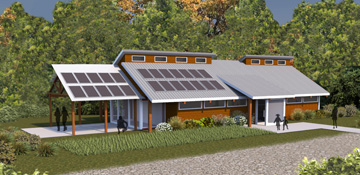Environmentally friendly building planned for Ross Biological Reserve
10-22-2013

The University's most environmentally friendly structure will be built next year at the Ross Biological Reserve, which is situated about 10 miles from Purdue's West Lafayette campus.
Called the Ross Reserve Sustainable Building Project, the 1,500-square-foot structure will support classes, meetings, summer programs and Biological Sciences' ecologist-in-residence, says Kerry Rabenold, professor of biological sciences and the reserve's director. It also will be a model for the University and others of affordable energy self-sufficiency through use of solar technology. Construction on the building will begin next spring.
"One of our goals with this project is to show that it's possible with off-the-shelf materials to build a structure whose net consumption of water and energy is zero," Rabenold says.
"This building will support teaching, research and outreach for our department as well as others, such as Forestry and Natural Resources. It will also serve for meetings and workshops, and it will be a practical example of sustainability. Students, faculty, and staff in the science, technology, engineering, agriculture and liberal arts fields have contributed many excellent ideas for this project, in part through a course called Ecological Principles in Building."
If all goes as planned, the building would be the first Purdue structure -- as well as the first built by any public university -- to receive certification from the Living Building Challenge, which is a stringent program for green building practices administered through the nonprofit International Living Future Institute. It also would be the first Purdue-owned building to earn Leadership in Energy and Environmental Design (LEED) platinum status.
The building is expected to achieve net-zero energy use by employing a photovoltaic solar array, a geothermal heat pump and hydronic radiant heating, and passive strategies to minimize energy demand. Building materials are being chosen to minimize environmental impact, and nearly all the wood in the structure will be from reclaimed sources such as a demolished building on campus, Rabenold says. Water use will also be very efficient, including the use of rainwater for native-plant gardens.
An agreement with Warren County REMC, an area utility company, will allow the solar power to feed into the grid during the summer, when there will be an abundance of solar energy. The building will use power from the grid during less sunny days. As a result, the building will achieve net-zero energy consumption, Rabenold says.
The University is in the final stages of fundraising for the project, which will be paid for using donations and a small grant from Tipmont County REMC, also an area utility company. A local architectural firm has produced a concept design for the building. A consulting firm will guide the Living Building Challenge certification process.
In addition to being used year-round for classes and community outreach events and as quarters for an ecologist-in-residence, who is usually a biology graduate student, the building will demonstrate the feasibility of creating incredibly environmentally friendly buildings to homeowners and others who wish to create such structures, Rabenold says.
"The climate is changing, fossil fuels are finite and energy costs will continue to increase -- and we all need to adapt to that," Rabenold says.
"This building will show that it's possible to address those concerns practically while creating a structure that serves many needs, including the academic and outreach needs of Purdue and the Ross Biological Reserve."
Writer: Amanda Hamon, 49-61325, ahamon@purdue.edu
Article originally appeared in Purdue Today October 22, 2013.